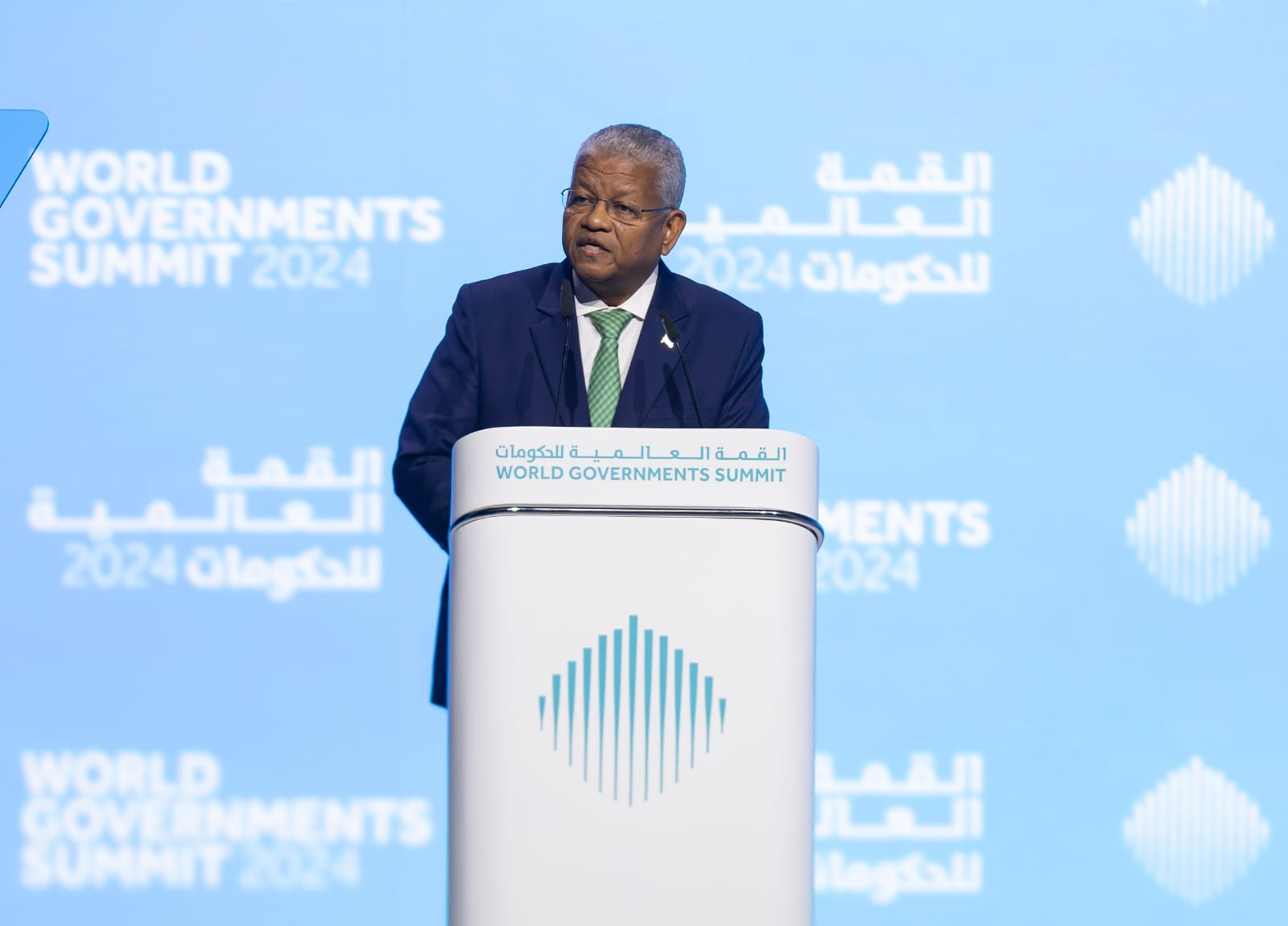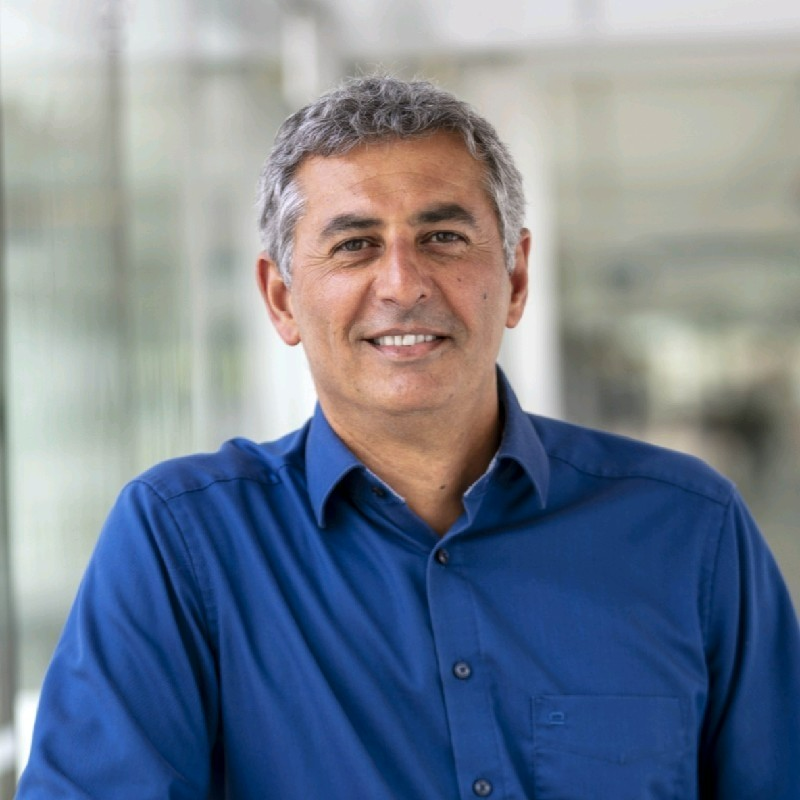Dubai, 13th February 2024: The President of the Republic, Mr. Wavel Ramkalawan joined several other world leaders at the World Governments Summit (WGS) 2024 currently being held in Dubai where he delivered his main address focussing on Seychelles’ Initiatives and Approaches to Ensure Sustainable Tourism and Balancing Preservation.
In his address to world leaders at the event, the Head of State underlined the pivotal role that Seychelles is playing in conservation, implementing various initiatives to promote sustainable tourism and safeguarding the nation’s ecological balance and economic well-being. He touched upon the Blue Economy, Seychelles Sustainable Tourism Label (SSTL), renewable energy sources and community involvement among other important initiatives.
“Central to Seychelles’ approach is its commitment to the Blue Economy, which includes designating a significant portion of the country’s marine territory as protected areas, including marine parks and reserves. These efforts are crucial in preserving biodiversity and safeguarding marine ecosystems for future generations.
Furthermore, Seychelles has established the Seychelles Sustainable Tourism Label (SSTL), a certification program that recognises tourism accommodations, operators, and services adhering to sustainable practices such as efficient waste management, energy conservation, and community engagement,” said President Ramkalawan.
He continued, “In its endeavour to reduce reliance on fossil fuels and mitigate environmental impacts, Seychelles has invested in renewable energy sources like solar and wind power. These initiatives not only contribute to reducing carbon emissions but also promote a more sustainable approach to tourism activities.
Seychelles also emphasises community involvement and empowerment in tourism development, encouraging local participation in decision-making processes and implementing community-based tourism projects to ensure that communities benefit from tourism revenue.”
The President also spoke about the significant strides that Seychelles has made in protecting its unique biodiversity through habitat restoration, invasive species control, and species protection programs, “Through such conservation efforts, Seychelles has achieved an enviable record of protecting 30% of its marine territory and 50% of its landmass.
The nation has also implemented environmentally conscious policies such as banning single-use plastics and plastic straws, promoting glass recycling, and conducting regular beach cleaning exercises,” he said.
The President also remarked that the Seychelles Government had imposed moratoriums on large hotel developments and temporary restrictions on room numbers on certain islands to ensure that future developments align with sustainability goals.
In regards to cultural tourism, President Ramkalawan spoke about Seychelles’ initiative through the Creole Rendezvous brand, which offers visitors immersive experiences to appreciate the local culture.
“Preserving and promoting Seychellois culture and heritage are integral to future development plans. Incorporating vernacular architectural styles, supporting local arts and crafts, and integrating cultural activities into urban planning are key components of sustainable development. Furthermore, environmental education and awareness among tourists and locals are key priorities for Seychelles, fostering a culture of sustainability and responsible tourism,” underlined the Head of State.
In its pursuit of sustainable development, President Ramkalawan said that Seychelles is investing in green projects across the islands, including eco-friendly buildings, renewable energy systems, waste management facilities, and smart technology solutions for infrastructure management and resource efficiency.
Regarding International Corporations and partnerships, the President further emphasized the need for the adoption of a Multidimensional Vulnerability Index (MVI) for Small Island Developing States (SIDS) and vulnerable countries.
He also spoke about Seychelles’ collaboration with the United Nations World Tourism Organization (UNWTO) on the Tourism Satellite Account (TSA) project, which has been instrumental in understanding the industry’s contribution to GDP, employment, and foreign exchange earnings.
He noted that through this collaboration, Seychelles’ objectives are to align tourism strategies with sustainable development goals and accurately assess the economic benefits of tourism.
To conclude, President Ramkalawan reiterated Seychelles’ commitment by focusing on sustainable governance, fostering international collaboration, and championing innovation. “Seychelles remains steadfast in its commitment to ensuring sustainable tourism practices that balance the preservation of natural resources with the economic benefits of tourism.
Through international cooperation, community involvement, and innovative initiatives, Seychelles aims to advance its island development objectives, build resilience against environmental challenges, and foster inclusive and equitable economic growth,” he said.
There were other main addresses by distinguished world leaders, including the President of the Republic of Madagascar, H.E. Andry Rajoelina, President of the Republic of Mauritius, H.E Mr. Pritvirajsingh Roopun, GCSK, and from the President of the Republic of Maldives, H.E. Dr. Mohamed Muizzu.
SOURCE
State House News



